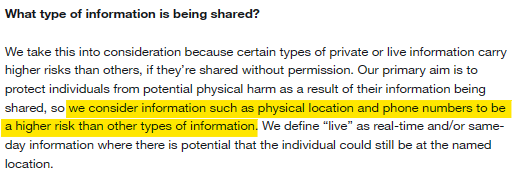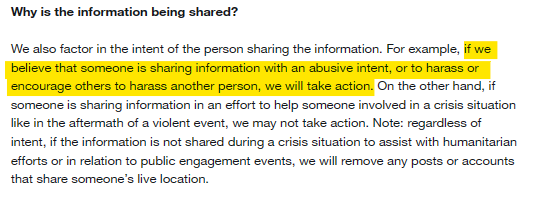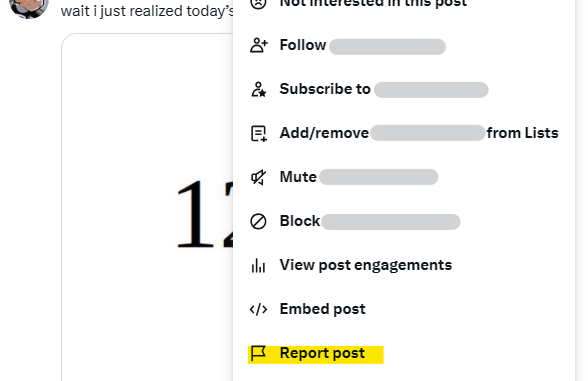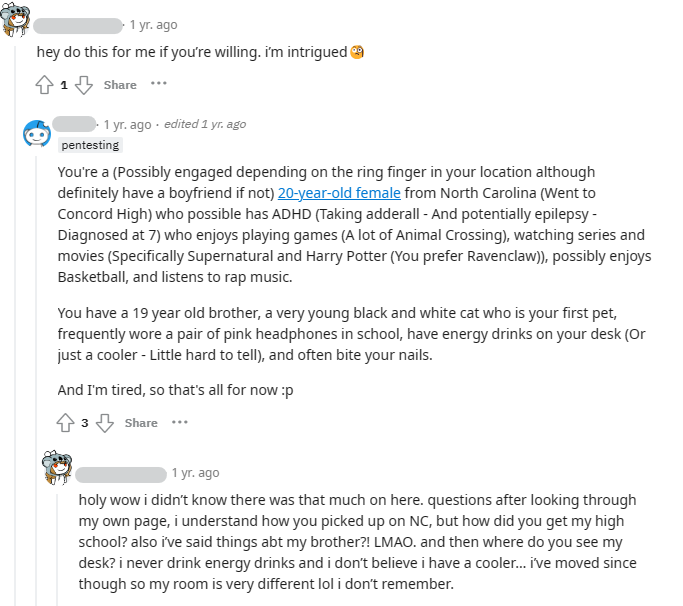Twitter Doxxing Policy: What You Need to Know
- Doxxing
- Is Doxxing Illegal?
- Twitter Doxxing Policy: What You Need to Know
Table of Contents
If you have a Twitter account and are worried that someone might publish your personal information without your consent (i.e., “doxx” you), it’s a good idea to familiarize yourself with Twitter’s doxxing policy.
In this guide, we’ll examine Twitter’s (now X) rules and policies to see what it says about doxxing. We’ll also look at other behaviors that are reportable on Twitter/X.
Twitter Doxxing Policy Explained
To protect its users, X (formerly known as Twitter) prohibits posting someone else’s personal information on the platform, including private media (such as photos or videos of private individuals).

X users are also not allowed to threaten to post other people’s identifying details, per Twitter policy.
The following information is expressly forbidden from being shared on X:
- Home address or information that provides specific location (such as GPS coordinates or flight information, a new rule made famous when the flight plan of Elon Musk’s private jet was shared by the ElonJet account);
- Live or real-time location;
- Identity documents, such as social security cards;
- Contact information, including home phone numbers and email addresses;
- Other private information, such as biometric data or medical records;
- Media depicting prisoners of war posted by state-affiliated media on or after April 5, 2022 (per Twitter’s new policy).
Other Behaviors That Are Not Permitted
Along with threatening to expose someone else’s information, Twitter rules prohibit sharing information that could lead to unauthorized access to someone’s online accounts (such as their login credentials), asking for a reward to post someone else’s information, or asking for a reward in exchange for not posting someone else’s information (blackmailing them, in other words) – regardless of whether the victim is a billionaire or otherwise.
4 Factors Twitter Takes Into Account When Reviewing Doxxing Reports
Twitter moderators will look at the type of information shared, who shared the information, why the information was shared, and if the information is available elsewhere on the web to decide if a) doxxing happened or b) the information shared is free speech.
1. Type of information shared
Since X’s moderation team prioritizes the physical safety of its users above all else, information that jeopardizes that (such as location information or home phone numbers) is considered more dangerous than other kinds of data.

In particular, X sees live or real-time (same-day) information as particularly risky.
For example, in 2022, X suspended journalists’ accounts (including Drew Harwell from The Washington Post, Donie O’Sullivan from CNN, Matt Binder from Mashable, and Ryan Mac from Times) following Elon Musk’s claims that they doxxed him. “You dox, you get suspended. End of story,” Musk reportedly said.
2. Who shared the information
X moderators also take into account who shared the information and if they had permission from the information’s owner to do so.
For example, if someone is making a call for article pitches or looking for business partners, and they post their phone number or email address and ask for it to be shared, this is seen by X as perfectly acceptable behavior and not doxxing.

3. Why was the information shared
Motive is another factor that X moderators consider.
If the information was shared with malicious intent or posted with a call to action that could lead to personal harm, X’s team will take action.

On the other hand, if the information is being posted to assist someone (such as after a major natural disaster) or in the public interest, X’s team will likely allow it.
4. Where else is the information available
Lastly, X moderators will see if the information published on Twitter is available elsewhere on the web.
If it is (for example, if an X user shared their email address on LinkedIn and then it was reposted by someone else on X), the incident might not be considered doxxing.

There’s one exception: If someone shared your home address, that might be treated as doxxing, even if this information is publicly available elsewhere.
What Is Not a Violation of Twitter Doxxing Policy?
Information-sharing behaviors that are acceptable on X include:
- Sharing your own information;
- Sharing location information after a length of time has passed (so it is not “live”);
- Sharing publicly available information in a non-abusive manner;
- Sharing non-private information, such as name, date of birth, some places of work, descriptions of physical appearance, gossip, or screenshots of messages from other platforms, unless they contain contact information.
What Happens If You Violate Twitter Doxxing Policy?
If you post private information (including live location information) about another user on Twitter once, you’ll be required to take down the information and undergo a brief suspension.
A second violation of Twitter’s doxxing policy will lead to a permanent ban.
Sharing private media of other individuals will lead to temporary suspension, according to Twitter’s anti-doxxing policy.
How to Report Doxxing on Twitter
You can report doxxing on Twitter on either mobile or desktop platforms, though the steps will be slightly different.
In both cases, it will involve clicking “Report Post” on the individual post and going from there.

For more information, read our guide on how to report doxxing on Twitter.
Where Do Doxxers Find My Info?
Personal information can show up in a number of public places online, including social media platforms and online forums. Making a few comments in an online forum can reveal a lot about you if you aren’t careful.
For example, here’s what one Reddit user was able to uncover about another user based on their posting history:

Another common place doxxers get information is data broker websites.
Data brokers are companies that collect information about you, compile this information into comprehensive profiles, and sell them to more or less anyone (often without asking what they will do with this information).
You can opt out of data brokers, but be aware that it is a lengthy process. You will need to contact each data broker with a profile on you, fill out the individual opt-out form, and then be ready to repeat the process when new information is uncovered and your profile is renewed.
Alternatively, you can subscribe to a data broker removal service like DeleteMe to have privacy experts continuously remove you from data brokers.
Become Undoxxable
The best way to prevent being doxxed on Twitter and other online platforms is to reduce your digital footprint and become undoxxable.
To do so, you’ll need to find out what information appears about you online. Use our guide on how to dox yourself with this list of self-doxxing tools.
Once you’ve identified where your information is showing up, delete as much of it as you can, and be careful about what new information you put out there from now on. This will make it harder for doxxers to find your personal information in the future.
For more information, read our guide on how to prevent doxxing.
DeleteMe is our premium privacy service that removes you from more than 30 data brokers like Whitepages, Spokeo, BeenVerified, plus many more.
Save 10% on DeleteMe when you use the code BLOG10.
Our privacy advisors:
- Continuously find and remove your sensitive data online
- Stop companies from selling your data – all year long
- Have removed 35M+ records of personal data from the web
Save 10% on any individual and family privacy plan with code: BLOG10












